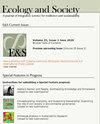Alaskan wild food harvester information needs and climate adaptation strategies
IF 3.2
2区 社会学
Q1 ECOLOGY
引用次数: 2
Abstract
Changing biophysical conditions due to amplified climate change in northern latitudes has significant implications for species’ habitat and populations and can dramatically alter interactions between harvesters and local resources. Tribal, regional, and state governments, federal agencies, and other local planning entities have begun documenting observations of changing harvest conditions and the information necessary for communities to adapt to shifting resource availability. We identify and evaluate what stakeholders are saying about wild foods in the context of climate change information needs in Alaska through a review of published grey literature (n = 87). Documents consistently expressed that climate change was impacting habitat conditions, resource distribution, and the abundance of wild foods. They solicited more information on biophysical processes (e.g., sea ice conditions) and populationlevel responses (e.g., shift in migration patterns). They also recommended that future projects focus on information that will improve food security, travel access, and community well-being. Documents suggested that communities have successfully sustained harvest practices, but most current adaptations are localized decisions being made by harvesters to manage the risks of current climate change. Strategies include finding new areas to hunt, substituting harvest species with other wild foods, or using new modes of travel. Documents also identified several adaptation strategies that still need to be implemented, and are dependent on actions by actors at larger scales; these strategies include legal, policy, and management actions to help reduce climate change impacts to wild food harvest. This review of the grey literature complements the climate-change literature by describing information needs of Alaskan wild food harvesters as well as providing tangible suggestions about how to improve adaptation and management strategies for harvesters grappling with changing resource conditions in the Arctic.阿拉斯加野生粮食收割机信息需求和气候适应策略
由于北纬地区气候变化加剧,生物物理条件的变化对物种栖息地和种群产生了重大影响,并可能极大地改变采集者与当地资源之间的相互作用。部落、地区和州政府、联邦机构和其他地方规划机构已经开始记录对不断变化的收获条件的观察,以及社区适应不断变化的资源可用性所必需的信息。我们通过对已发表的灰色文献(n = 87)的回顾,确定和评估利益相关者在阿拉斯加气候变化信息需求背景下对野生食品的看法。文献一致表明,气候变化正在影响栖息地条件、资源分布和野生食物的丰度。他们要求提供更多关于生物物理过程(例如,海冰状况)和种群水平反应(例如,迁移模式的转变)的信息。他们还建议,未来的项目应侧重于能够改善粮食安全、旅行便利和社区福祉的信息。文件表明,社区已经成功地维持了采收做法,但目前的大多数适应措施是采收者为管理当前气候变化风险而做出的本地化决策。策略包括寻找新的狩猎区域,用其他野生食物代替收获物种,或使用新的旅行方式。文件还确定了仍需实施的若干适应战略,这些战略依赖于行动者在更大范围内的行动;这些战略包括法律、政策和管理行动,以帮助减少气候变化对野生粮食收获的影响。这篇灰色文献综述通过描述阿拉斯加野生食物采集者的信息需求来补充气候变化文献,并就如何改善采集者在北极不断变化的资源条件下的适应和管理策略提供切实的建议。
本文章由计算机程序翻译,如有差异,请以英文原文为准。
求助全文
约1分钟内获得全文
求助全文
来源期刊

Ecology and Society
环境科学-生态学
CiteScore
6.20
自引率
4.90%
发文量
109
审稿时长
3 months
期刊介绍:
Ecology and Society is an electronic, peer-reviewed, multi-disciplinary journal devoted to the rapid dissemination of current research. Manuscript submission, peer review, and publication are all handled on the Internet. Software developed for the journal automates all clerical steps during peer review, facilitates a double-blind peer review process, and allows authors and editors to follow the progress of peer review on the Internet. As articles are accepted, they are published in an "Issue in Progress." At four month intervals the Issue-in-Progress is declared a New Issue, and subscribers receive the Table of Contents of the issue via email. Our turn-around time (submission to publication) averages around 350 days.
We encourage publication of special features. Special features are comprised of a set of manuscripts that address a single theme, and include an introductory and summary manuscript. The individual contributions are published in regular issues, and the special feature manuscripts are linked through a table of contents and announced on the journal''s main page.
The journal seeks papers that are novel, integrative and written in a way that is accessible to a wide audience that includes an array of disciplines from the natural sciences, social sciences, and the humanities concerned with the relationship between society and the life-supporting ecosystems on which human wellbeing ultimately depends.
 求助内容:
求助内容: 应助结果提醒方式:
应助结果提醒方式:


